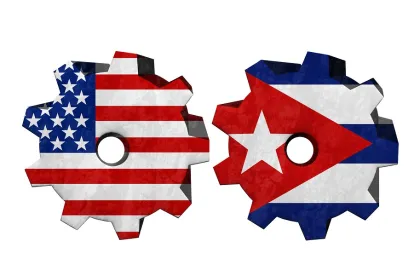Today, the Department of Treasury Office of Foreign Assets Control (OFAC) and the Department of Commerce Bureau of Industry and Security (BIS) published in the Federal Register amendments to regulations affecting travel to Cuba. The amendments:
-
Eliminate authorization for people-to-people educational travel that is unrelated to an undergraduate or graduate degree program; and
-
Generally prevent travel to/from Cuba – even if otherwise authorized by OFAC – by aircraft or vessels that are subject to U.S. export controls other than commercial aircraft (or air ambulance), or cargo vessels for hire for use in the transportation of separately authorized items.
Why has the U.S. taken this step? According to Commerce Secretary Wilbur Ross, “Cuba remains communist, and the United States, under the previous administration, made too many concessions to one of our historically most aggressive adversaries … The Trump Administration recognizes the threat Cuba’s government poses in the region, and the Commerce Department is acting to limit commercial activity that provides revenue for the Cuban regime. Holding other countries accountable remains a focus for this Administration and we will remain vigilant.” The State Department further elaborated that “[t]he United States holds the Cuban regime accountable for its repression of the Cuban people, its interference in Venezuela, and its direct role in the man-made crisis led by Nicolas Maduro,” noting its assessment that “[t]hese actions are directly linked to the tourism industry, which has strong economic ties to the Cuban security, military, and intelligence sectors in Cuba.”
Amendment to the Cuban Asset Control Regulations
OFAC’s amendment (84 FR 25992) revises the Cuban Asset Control Regulations (“CACR”) to terminate the general license (GL) for group people-to-people educational exchanges, previously found at 31 C.F.R. 515.565(b). This GL permitted certain educational exchanges with Cuba that did not involve academic study pursuant to a degree program, and associated travel.
The amendment does not revoke other existing general licenses for specific categories of Cuba travel, including the authorization at 31 C.F.R. 515.565(a) for certain educational activities and related travel conducted under the auspices of accredited U.S. graduate or undergraduate degree-granting academic institutions.[1] However, the Department of Commerce amendments described below may affect the method by which such travel can be accomplished (e.g., limiting travel options to commercial aircraft).
Notably, for travelers who have already made arrangements in reliance on the rescinded GL, the amendment to the CACR contains a “grandfathering” provision that permits group people-to-people educational travel to go forward provided that: (i) it fits within the scope of the former authorization; and (ii) the traveler completed at least one travel-related transaction (such as purchasing a flight or reserving accommodation) before June 5, 2019. However, the Department of Commerce amendments discussed below do not appear to contain a parallel grandfathering provision, an omission that may nullify the value of the OFAC grandfathering provision for any travelers who were planning to travel to Cuba by means other than commercial aircraft.
The OFAC amendment also adds a note to the general license at 31 C.F.R. 515.572, which authorizes, among other things, the provision of travel and carrier services to, from, and within Cuba in connection with authorized travel. The note is intended as a reminder that, consistent with the U.S. embargo on Cuba, authorization from the Department of Commerce is required for the export or reexport to Cuba of all items subject to the Export Administration Regulations (EAR), 15 C.F.R. 730 et seq. This is significant because items subject to the EAR include aircraft and vessels registered in or departing from the United States (the movement of such vehicles to Cuba constitutes an “export or reexport” and is subject to U.S. export controls), and the Department of Commerce amendments discussed below significantly reduce the export authorization available for vessels and aircraft to travel to Cuba.
Amendment to the Export Administration Regulations
The OFAC general license that authorizes travel and carrier services from the perspective of U.S. economic sanctions regulations does not itself authorize the export or reexport to Cuba of vessels and aircraft used to accomplish the travel, or of any other item subject to the EAR. Rather, as set out in 15 C.F.R. 746.2, and highlighted by the new note to the OFAC educational travel GL discussed above, authorization from the Department of Commerce, in the form of an export license or license exception, is required for the export or reexport to Cuba of all items subject to the EAR, a category that includes aircraft and vessels registered in or departing from the United States.
Export licenses for Cuba have long been subject to a general policy of denial. However, 15 C.F.R. 746.2 identifies certain license exceptions, or portions of license exceptions, that are available for exports and reexports to Cuba. These include license exception BAG (15 C.F.R. 740.14), which authorizes export of personal and household effects, vehicles, and “tools of trade,” and License Exception AVS (15 C.F.R. 740.15), which authorizes temporary export of aircraft and vessels.
The Department of Commerce amendment (84 FR 25986) revises the scope of AVS with the result that only commercial aircraft, air ambulances, and cargo vessels for hire for use in the transportation of separately authorized items are now eligible to use AVS to authorize temporary travel to Cuba.[2] Thus, even if travel to Cuba would be authorized under an OFAC general license, or the grandfathering provision referenced above, travel by private and corporate aircraft, cruise ships, sailboats, fishing vessels, and other similar aircraft and vessels subject to U.S. export controls is no longer authorized as a matter of U.S. export control law, absent a license from the Department of Commerce. According to the simultaneous revision to the statement of licensing policy in 15 C.F.R. 746.2, such licenses are unlikely to be granted absent extraordinary circumstances (e.g., use in oil-spill response).[3]
Unlike the OFAC amendment, the changes to the EAR do not include a grandfathering provision. As a result, travelers who have already booked travel to Cuba by some means other than commercial aircraft may find that they can no longer travel by that method, unless the provider is able to obtain a license from the Department of Commerce, or unless the Department of Commerce announces an exception for e.g., ocean cruises that fall within the scope of an OFAC general license and were scheduled before the announcement of the changes to AVS.
More Amendments Ahead?
The amendments to the CACR and the EAR follow an April 17, 2019 speech in which National Security Advisor Ambassador John Bolton announced that the Administration would further roll back Obama-era changes to the CACR, including by restricting non-family travel and limiting remittances to $1,000 per person per quarter. The amendments published today only implement the announcement regarding non-family travel; additional amendments will be necessary to effectuate the remaining restrictions foreshadowed by Ambassador Bolton.
Reminders for Travelers to Cuba
Travel to Cuba by persons subject to U.S. jurisdiction is prohibited unless a GL applies, and the OFAC amendment published today eliminates one of the commonly-used travel authorizations. As travelers may no longer use the GL for group people-to-people educational travel (unless the “grandfathering” provision of the amendment applies), they must assess whether planned travel falls under one of the remaining GLs, each of which comes with very specific conditions and limitations. Travelers to Cuba should, at a minimum:
-
Carefully review the requirements for each GL, verify that every aspect of their travel to and within Cuba complies with those requirements and the requirements set out in 31 C.F.R. 515.560, and document their rationale for concluding that a particular GL authorizes the travel.
-
Ensure that their method of travel is authorized – under the Department of Commerce amendment, those planning to visit Cuba by cruise ship or private jet may be compelled to switch to commercial aircraft.
-
Be aware that U.S. law prohibits direct financial transfers to certain Cuban entities determined to be under the control of, or acting for or on behalf of, the Cuban military, intelligence, or security services or personnel. These entities include certain hotels, ports, and stores, as well as more obvious Cuban government entities. To avoid doing business with such entities, travelers should consult the Cuba Restricted List maintained by the State Department.
-
Verify that items they bring with them to Cuba are authorized under U.S. export controls.
-
Keep, for five years after their travel, detailed records of their activities in Cuba, including a schedule of activities and receipts documenting their expenses, in order to prove that they complied with the terms of the relevant GL.
Additional Resources
In addition to the amendments, OFAC published a Fact Sheet and updated Frequently Asked Questions.





 />i
/>i

